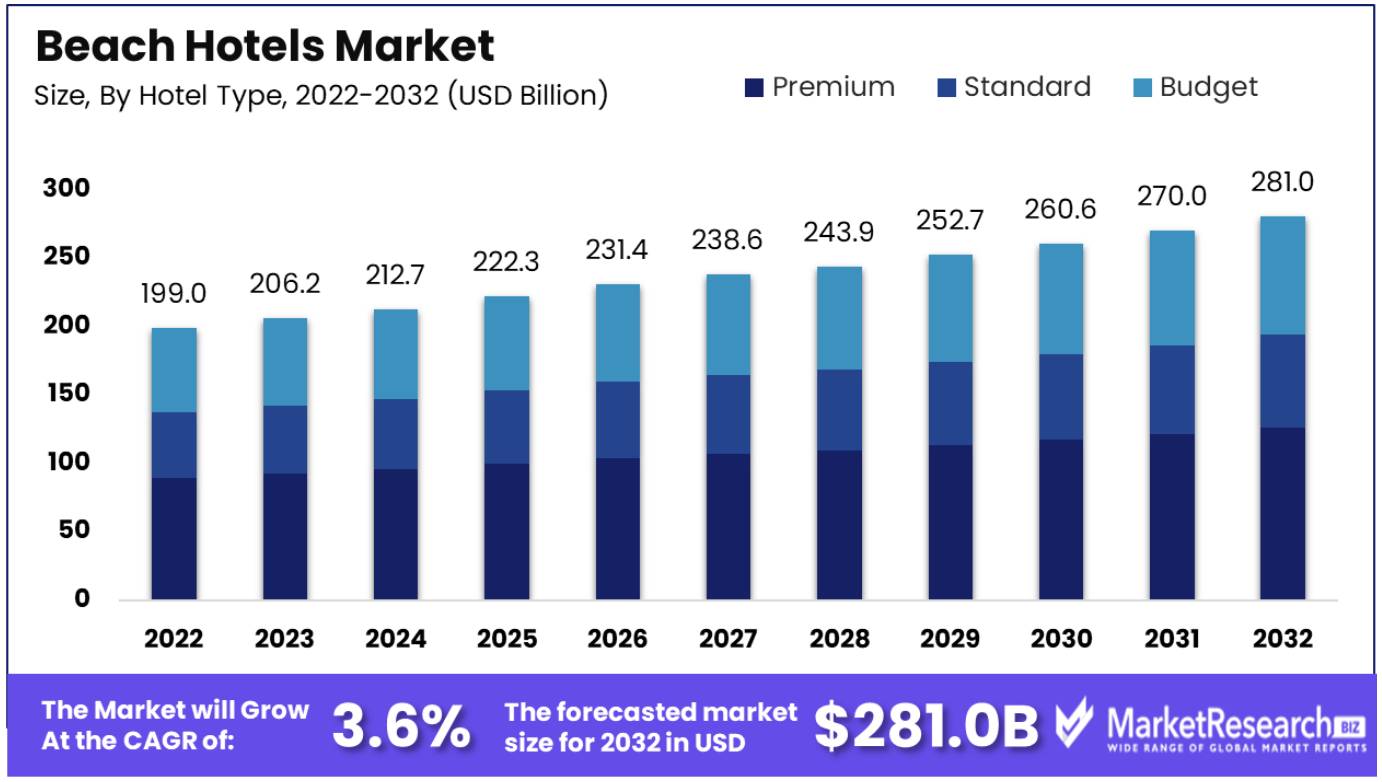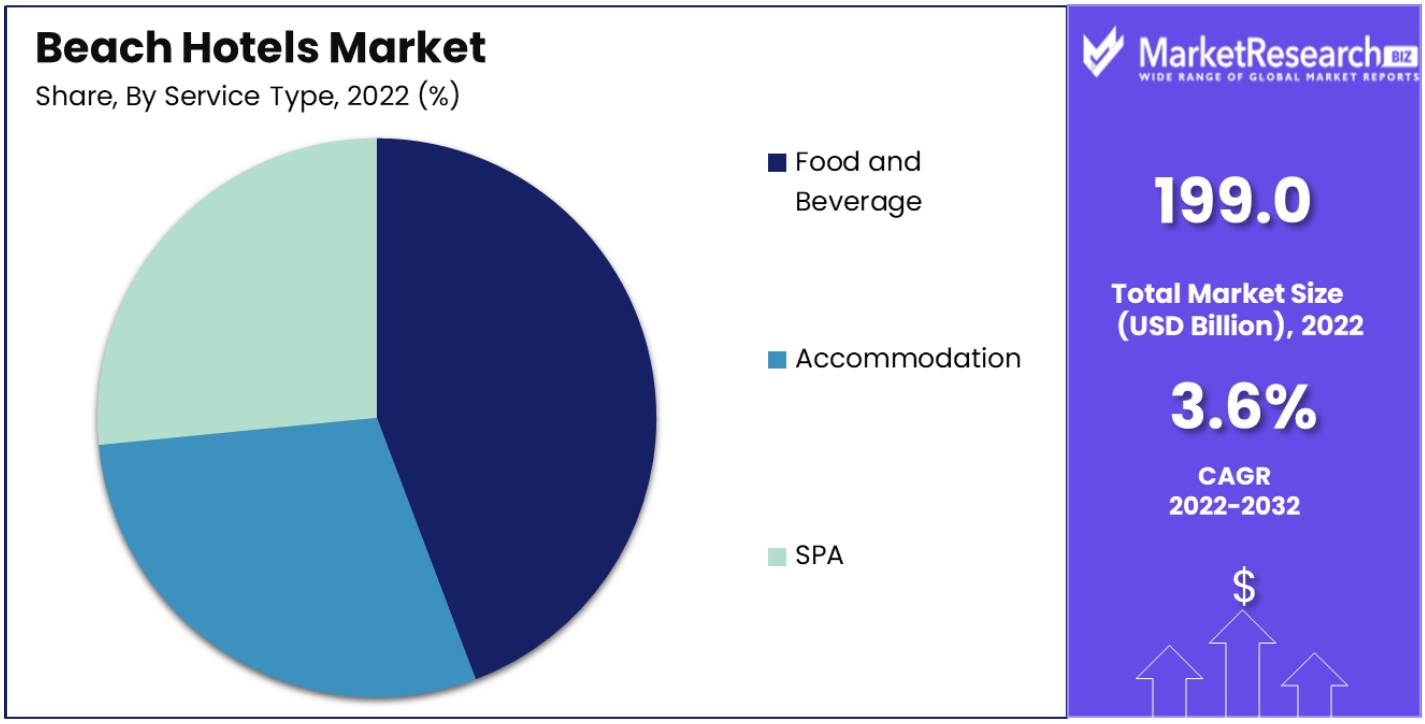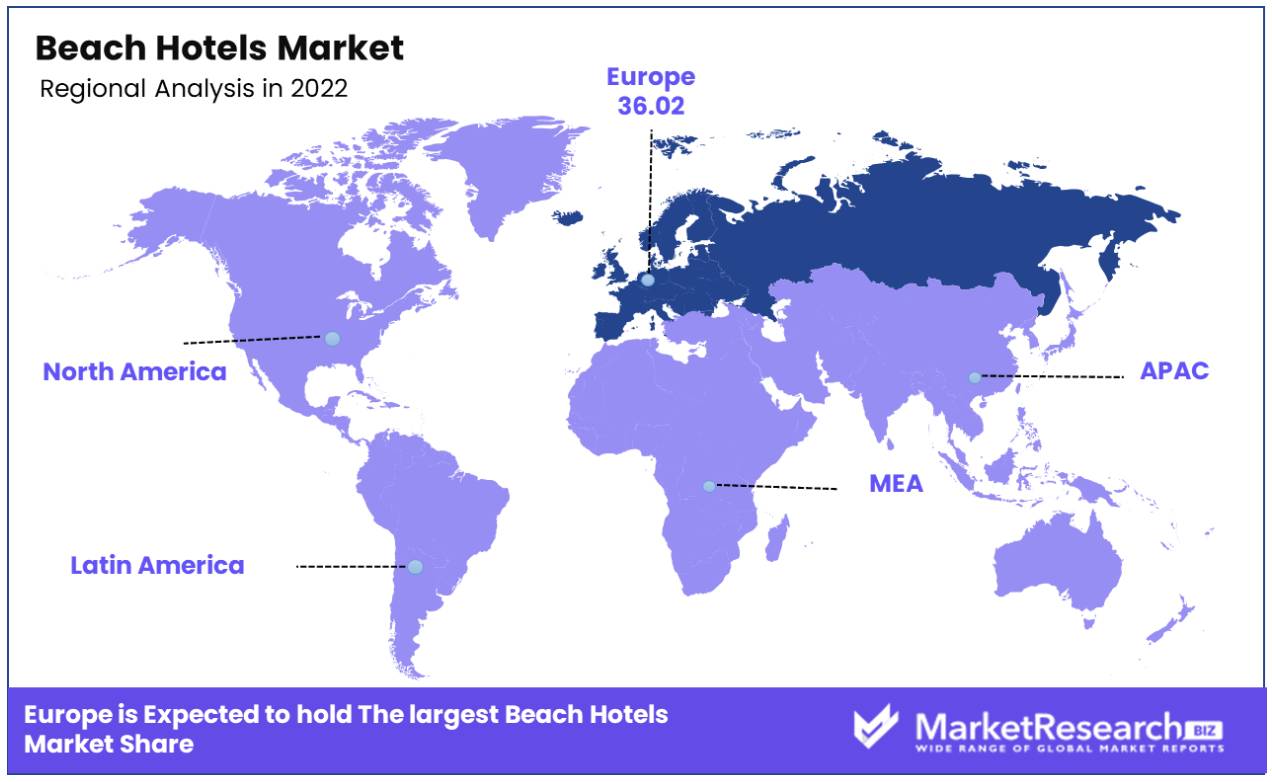
Beach hotels market By Hotel Type(Premium, Standard, Budget), By Service Type(Food and Beverage, Accommodation, SPA), By Occupants(Group Occupancy, Solo Occupancy), By Region And Companies - Industry Segment Outlook, Market Assessment, Competition Scenario, Trends, And Forecast 2023-2032
-
9870
-
May 2023
-
177
-
-
This report was compiled by Kalyani Khudsange Kalyani Khudsange is a Research Analyst at Prudour Pvt. Ltd. with 2.5 years of experience in market research and a strong technical background in Chemical Engineering and manufacturing. Correspondence Sr. Research Analyst Linkedin | Detailed Market research Methodology Our methodology involves a mix of primary research, including interviews with leading mental health experts, and secondary research from reputable medical journals and databases. View Detailed Methodology Page
-
Quick Navigation
Report Overview
Beach hotels market size is expected to be worth around USD 281.0 Bn by 2032 from USD 199.0 Bn in 2022, growing at a CAGR of 3.6% during the forecast period from 2023 to 2032.

One of the major driving factors for the beach hotel market is the huge demand for tourists. Post-pandemic, the tourism sector has witnessed a sudden boost in the market as people are now visiting their favorite destinations. This has increased expenses and upsurged the living standards in many developing countries which has led to market expansion. Currently, many people prefer the beach as their main holiday destination with family and friends. The WTTC has recovered their pre-pandemic losses now and the tourism industry is expanding, this drives the market of beach hotels throughout the forecasted period.
The government has taken a lot of initiatives and investments in the tourism sector to construct new infrastructure and promote tourism management. The Indian government has also introduced a campaign to create awareness about hygiene, easy air connectivity globally, and enhance hospitality. Likewise, the US government will fund about USD 270 million to Brand USA, a US marketing firm, to support them in promoting inbound tourism in many important markets.
The Brand USA represents a substantial step in the recovery of the US travel and tourism industry following many nations welcoming foreign visitors. Once international travel restrictions get relaxed, the ongoing investments will be utilized by Brand USA and its stakeholders to increase the requirements, store visitor’s confidence and speed up the return of foreign travel and expenses.
Technology advancement plays a vital role in boosting the beach hotel market. The increase in per capita in developing countries, rising individual power, demand for traveling, and other discounts, coupons, or vouchers offered while booking on the Internet promote industry growth.
There is a growing desire to have a luxury vacation experience due to more income from the people providing high-end hospitality and services. For example, some of the luxury beach hotels in Ravello (Italy), Aman (Tokyo), and the Belmond Hotel Caruso are witnessing a huge demand for luxury vacation stay experiences by offering good hospitality. The global beach hotel market is expected to boost the current market situation due to the existence of several international and local businesses. These firms can work in several industries throughout the world that integrate beach hotels into their business tactics.
Driving factors
Increasing Tourism Drives Beach Hotels Market Growth
The burgeoning growth of the beach hotels market is significantly propelled by the steady increase in global tourism. As international travel becomes more accessible and affordable, there is a notable rise in the number of tourists flocking to coastal destinations. This influx is not limited to traditional peak seasons but is becoming a year-round trend, supported by the growing appeal of beach vacations among diverse demographic segments.
Data and trends indicate a correlation between the increase in disposable incomes and leisure travel, with beach destinations topping the preference lists for holidays. The modern traveler’s quest for picturesque locales and unique experiences directs a substantial volume of tourism flow toward beachfront accommodations. This sustained increase in tourism directly translates to higher occupancy rates and revenue for beach hotels, spurring market growth.
The ripple effect of this heightened demand encourages the development of related services and amenities, creating a holistic growth ecosystem. Long-term, the tourism sector's sustained interest in coastal areas could lead to a more comprehensive development of beachfront regions, encompassing transportation, entertainment, and conservation efforts to maintain the appeal of these destinations.
Luxury and Ease Propel Seaside Accommodation Drive Beach Hotels Market Growth
The quest for comfort and convenience stands as a significant driver in the beach hotels market. Travelers increasingly seek out destinations that offer a seamless experience, combining the natural allure of beach landscapes with the luxury of modern amenities. This demand for high-quality, convenient lodging options where guests can enjoy the beach with minimal hassle is leading to an evolution in the services and facilities provided by beach hotels.
In response, beach hotels are enhancing their offerings with value-added services such as all-inclusive packages, wellness and spa services, and personalized guest experiences. These enhancements are designed to meet the expectations of both the luxury traveler and the convenience-oriented guest. The integration of technology for smooth booking and stay experiences further complements this drive towards convenience.
The emphasis on comfort and convenience is likely to persist as a key market influencer, potentially setting new standards for what constitutes a premium beachfront hotel experience. In the long term, these expectations may drive continual upgrades in hotel offerings and could lead to the widespread adoption of smart hotel features and more intuitive guest service technologies.
Favorable Government Support Drives Beach Hotels Market Growth
Favorable government policies and support play a pivotal role in the expansion of the beach hotels market. Governments of coastal countries often recognize the economic potential of beach tourism and, as such, implement measures to foster its growth. This support can come in various forms, including infrastructure development, promotional campaigns targeting international tourists, and investment incentives for hospitality businesses.
By improving accessibility and creating a tourism-friendly environment, governments can significantly enhance the attractiveness of beach destinations. Strategic marketing campaigns can raise the profile of less well-known beaches, driving tourism and supporting hotel market growth. Additionally, incentives such as tax breaks or subsidies for hotel construction can encourage investment in beachfront properties.
Online Booking Discounts Drive Beach Hotels Market Growth
Discounts offered on online bookings have become a vital major factor in the beach hotels market growth. The proliferation of online travel agencies (OTAs) and direct booking platforms has made it easier for travelers to find and compare hotel options. Competitive pricing and the convenience of online booking are significant motivators for tourists, often influencing their accommodation choices.
Hotels that provide discounts and special offers through online channels benefit from increased visibility and booking rates. The data-driven nature of online platforms allows for targeted promotions, reaching potential guests during the decision-making process. These discounts are particularly appealing to cost-conscious travelers and can sway decisions during peak travel seasons.
The strategic use of online discounts helps hotels manage occupancy rates effectively and can lead to increased revenue through up-selling and cross-selling opportunities. In the long term, the proliferation of online booking and the expectation of discounts may lead to more dynamic pricing models in the beach hotel market, as well as the need for hotels to differentiate themselves through unique offerings beyond just competitive pricing.
Restraining Factors
High Costs of Beach Hotel Stay Restrain Market Growth
The elevated costs associated with beach hotel stays act as a significant barrier to market growth. Beachfront properties typically incur higher operational and maintenance expenses, which are passed on to consumers in the form of higher prices. These costs can be prohibitive for a large segment of potential guests, particularly in an economic climate where consumers are increasingly cost-conscious. Additionally, the premium pricing of beach hotel packages, which often include amenities and exclusive experiences, can deter budget-sensitive travelers, leading them to seek more economical vacation options.
Competition from Alternative Accommodations Restrains Beach Hotels Market Growth
The market for beach hotels is notably restrained by competition from other types of accommodations, such as vacation rentals, hostels, and timeshare units. These alternatives often offer competitive pricing and more personalized experiences, which appeal to a broad range of travelers, especially millennials seeking unique and cost-effective lodging options. The rise of online platforms that facilitate the booking of such accommodations has increased their accessibility and popularity, placing additional pressure on beach hotels to differentiate their offerings and value proposition to maintain market share.
Segmentation Analysis of the Beach Hotels Market
By Hotel Type Analysis
The premium beach hotels segment secures the leading position in the market, driven by the rising demand for luxury travel experiences among affluent travelers. These establishments offer exclusive beachfront access, superior amenities, personalized services, and privacy, highly valued by high-net-worth individuals. The growth of this segment is buoyed by the increasing consumer inclination towards exotic and unique travel experiences combined with luxury.
The standard and budget hotel segments serve the mid-range and cost-conscious travelers, respectively. Standard hotels offer a balance between amenities and price, targeting families and couples, while budget hotels attract backpackers and travelers prioritizing savings over luxury. Both segments are essential for catering to a wide audience and ensuring inclusivity in the beach hotel market.
By Service Type Analysis
The Food & beverages service is paramount in beach hotels, often serving as the main draw for guests seeking a complete vacation experience. The provision of high-quality, diverse culinary options can significantly enhance guest satisfaction and contribute to the hotel's reputation. This segment growth is expected to grow as hotels continue to innovate their dining experiences to meet evolving guest preferences.
While accommodation is a fundamental service, it is the quality and diversity of the SPA services that are increasingly becoming differentiators for beach hotels. The SPA segment, offering wellness and relaxation services, capitalizes on the growing trend of health and wellness tourism.

By Occupants Analysis
Group occupancy holds the largest market share in beach hotels due to the segment's appeal among families, corporate retreats, and event planners. The ability to host groups contributes significantly to revenue, as these bookings typically encompass multiple rooms and additional services such as event spaces and group activities.
Solo occupancy caters to individual travelers, often business professionals or solo tourists seeking a peaceful getaway. While this segment is smaller compared to group occupancy, it represents a significant portion of the market with a steady growth trajectory driven by the increasing trend of solo travel.
The beach hotels market thrives on the diverse needs of global travelers, with each segment playing a crucial role in the industry’s dynamics. Premium beach hotels continue to lead the market, capitalizing on the growing luxury travel trend, while food and beverage services remain a key differentiator in enhancing the guest experience. Group occupancy drives the majority of bookings, supported by the broad appeal of beach destinations for collective travel experiences.
Key Market Segments
By Hotel Type
- Premium
- Standard
- Budget
By Service Type
- Food and Beverage
- Accommodation
- SPA
By Occupants
- Group Occupancy
- Solo Occupancy
Growth Opportunity
Rising Disposable Incomes Offer Growth Opportunity for Beach Hotels
Increased disposable incomes globally have a direct positive impact on the beach hotel market. As people have more discretionary funds, there's a trend towards increased travel and willingness to spend on accommodations with premium experiences.
The beach hotel segment can capitalize on this by offering tailored experiences that align with the lifestyle aspirations of these consumers. According to the World Travel & Tourism Council, for the eighth consecutive year, the travel and tourism sector has outpaced the growth of the global economy, indicating a robust linkage between disposable income and travel spending.
New Market Expansions Offer Lucrative Avenues for Beach Hotels
The strategic expansion into new and under-served regions is a significant growth vector for beach hotels. By identifying and establishing a presence in emerging coastal destinations, businesses can tap into early market potential before saturation sets in.
The United Nations World Tourism Organization highlights the trend of tourists seeking unique and authentic experiences, which these new markets can provide. Furthermore, under-served regions may offer incentives and lower barriers to entry, making the proposition even more attractive for hotel chains looking to diversify their portfolio.
Water Sports Activities Offer Enhanced Attraction for Beach Hotels
Expansion Role: The popularity of water sports activities offers beach hotels an opportunity to diversify and enhance their appeal. By offering or partnering with local providers of water sports, hotels can attract adventure-seeking guests and position themselves as destinations for both relaxation and excitement.
The global water sports gear and equipment market, expected to grow at a CAGR of 3.6% from 2023 to 2032, underscores the increasing demand for such activities. This trend enables beach hotels to create packages that include water sports, appealing to a segment of travelers who prioritize activities in their vacation planning.
Regional Analysis
Europe Dominates with 36.20% Market Share in the Beach Hotels Market
Europe’s substantial 36.20% market share in the beach hotels industry is a testament to its vast and appealing coastline along the Mediterranean, the Atlantic, and beyond. Key factors contributing to this dominance include rich cultural heritage, diverse coastal destinations, and well-established tourism infrastructure. Countries like Spain, France, Italy, and Greece, with their renowned beach destinations, draw millions of visitors annually.
The regional dynamics are enhanced by the ease of intra-regional travel facilitated by the Schengen Agreement and well-connected transportation systems. Europe’s emphasis on sustainable tourism and the preservation of historical sites also enriches the beach hotel experience, adding to its allure.
Looking ahead, Europe's market presence is expected to remain influential due to continuous investment in tourism and hospitality, the integration of technology in travel experiences, and a strong focus on personalized guest experiences. The forecast also suggests that the growing trend towards eco-friendly and health-oriented vacations may spur further innovations in the beach hotel segment, solidifying Europe's market position.

North America: A Robust Competitor in the Beach Hotels Market
In North America, the beach hotels market thrives, driven by extensive coastlines and a well-entrenched luxury hospitality sector. Destinations like Florida, California, and the Caribbean islands are pivotal, offering a blend of natural beauty and world-class amenities. The North American market benefits from a high-spending tourist demographic, seeking both relaxation and adventure by the sea.
Asia-Pacific: An Emerging Powerhouse in the Beach Hotels Market
Holding a significant share, Asia-Pacific's beach hotels market is growing rapidly. The region's rich tapestry of islands and coastal regions, particularly in Southeast Asia, combined with its relatively cost-effective hospitality services, attract a global clientele.
Key market dynamics include the development of previously untapped locations and the increasing accessibility of beach destinations. The region's commitment to blending local cultural experiences with modern luxury appeals to a diverse range of travelers.
Key Regions and Countries
North America
- The US
- Canada
- Rest of North America
Europe
- Germany
- France
- The UK
- Spain
- Italy
- Russia
- Netherlands
- Rest of Europe
Asia-Pacific
- China
- Japan
- South Korea
- India
- New Zealand
- Singapore
- Thailand
- Vietnam
- Rest of Asia Pacific
Latin America
- Brazil
- Mexico
- Rest of Latin America
Middle East & Africa
- South Africa
- Saudi Arabia
- UAE
- Rest of Middle East & Africa
Key Players Analysis
The beach hotels market is distinguished by the presence of global hospitality leaders whose strategic positioning and operational excellence redefine the coastal hospitality experience. Accor SA, Marriott International, Inc., and Hilton Worldwide Holdings Inc. have a widespread international presence, offering a diverse portfolio from luxury to budget-friendly beachfront properties, positioning them as market shapers in both reach and service diversity. Hyatt Hotels Corporation and InterContinental Hotels Group PLC (IHG) are notable for their customer loyalty programs and bespoke experiences, enhancing their competitive edge and market influence.
Shangri-La International and Four Seasons Holdings Inc. are synonymous with high-end luxury and personalized services, attracting an elite clientele and setting the benchmark for opulence in beachfront lodging. ITC Limited's focus on heritage and sustainable practices marks its unique market positioning within the Indian context.
The collective influence of these market players drives the industry trend forward, with a focus on sustainability, innovation in guest experiences, and expansion in emerging beach destinations, reflecting the dynamic nature of the beach hotels market.
Top Key Players in the Beach Hotels Market
- Accor S.A
- The Indian Hotels Company Limited
- Hyatt Hotels Corporation
- Shangri-La International Hotel Management Ltd.
- Marriott International, Inc.
- Four Seasons Holdings Inc.
- ITC Limited
- Hilton Worldwide Holdings Inc.
- InterContinental Hotels Group PLC
- Wyndham Destinations, Inc.
- IHG
- Montage Laguna Beach
- Jade Mountain
- Belmond Maroma Resort & Spa
- Radisson Hospitality, Inc.
Recent Development
- In October 2023, Brittain Resorts & Hotels (BRH) made significant strides in enhancing its revenue management technology by adopting SiteMinder, a leading software platform designed to optimize hotel revenue potential.
- In August 2023, London Bay Development, a Naples-based developer, purchased the Outrigger Beach Resort and Charley’s Boathouse Grill on Fort Myers Beach for $38.2 million.
- In August 2023, Nantucket was named the most expensive beach destination in the world according to a survey by TravelMag.com. Nantucket led the ranking at $694 per night, surpassing Italian and French coastal destinations. Positano, Italy's Amalfi Coast, was the second most expensive at $481 per night.
- In July 2023, The Coast Rehoboth Beach, Tapestry Collection by Hilton, a 60-room upscale boutique hotel developed by Harvey Hanna & Associates (HHA), officially opens in downtown Rehoboth Beach.
- In 2023, Earlier in the summer, a waterfront Nantucket home in Monomoy was sold for a record-breaking $38.1 million in Massachusetts.
Report Scope
Report Features Description Market Value (2022) USD 199.0 Bn Forecast Revenue (2032) USD 281.0 Bn CAGR (2023-2032) 3.6% Base Year for Estimation 2022 Historic Period 2016-2022 Forecast Period 2023-2032 Report Coverage Revenue Forecast, Market Dynamics, COVID-19 Impact, Competitive Landscape, Recent Developments Segments Covered By Hotel Type(Premium, Standard, Budget), By Service Type(Food and Beverage, Accommodation, SPA), By Occupants(Group Occupancy, Solo Occupancy) Regional Analysis North America - The US, Canada, Rest of North America, Europe - Germany, France, The UK, Spain, Italy, Russia, Netherlands, Rest of Europe, Asia-Pacific - China, Japan, South Korea, India, New Zealand, Singapore, Thailand, Vietnam, Rest of Asia Pacific, Latin America - Brazil, Mexico, Rest of Latin America, Middle East & Africa - South Africa, Saudi Arabia, UAE, Rest of Middle East & Africa Competitive Landscape Accor SA, The Indian Hotels Company Limited, Hyatt Hotels Corporation, Shangri-La International Hotel Management Ltd., Marriott International, Inc., Four Seasons Holdings Inc., ITC Limited, Hilton Worldwide Holdings Inc., InterContinental Hotels Group PLC, Wyndham Destinations, Inc., Montage Laguna Beach, Jade Mountain, Belmond Maroma Resort & Spa, Radisson Hospitality, Inc. Customization Scope Customization for segments, region/country-level will be provided. Moreover, additional customization can be done based on the requirements. Purchase Options We have three licenses to opt for: Single User License, Multi-User License (Up to 5 Users), Corporate Use License (Unlimited User and Printable PDF) -
-
- Accor S.A
- The Indian Hotels Company Limited
- Hyatt Hotels Corporation
- Shangri-La International Hotel Management Ltd.
- Marriott International, Inc.
- Four Seasons Holdings Inc.
- ITC Limited
- Hilton Worldwide Holdings Inc.
- InterContinental Hotels Group PLC
- Wyndham Destinations, Inc.
- IHG
- Montage Laguna Beach
- Jade Mountain
- Belmond Maroma Resort & Spa
- Radisson Hospitality, Inc.




